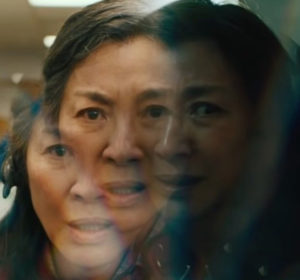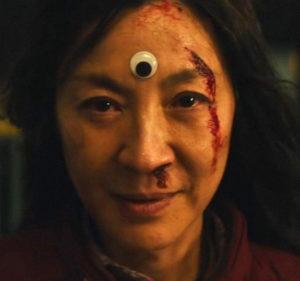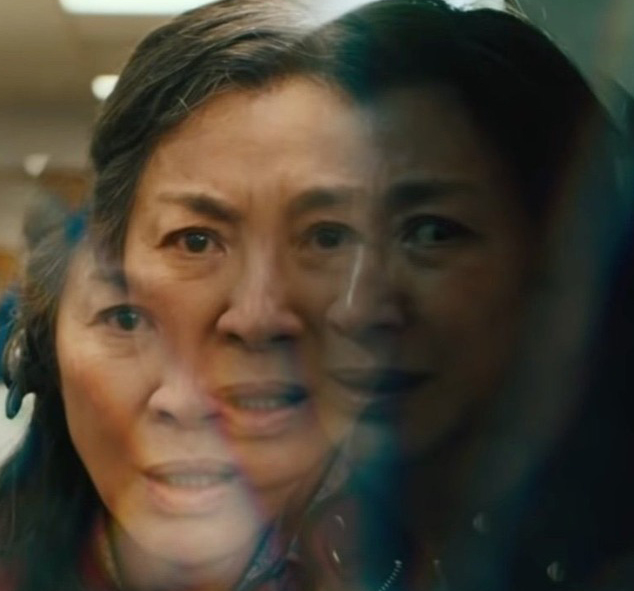#20 EVERYTHING EVERYWHERE ALL AT ONCE AS PRISMATIC MANDALA OF CONSCIOUSNESS
I’ve been meaning, since first I saw it, to write about Everything Everywhere All at Once (2022), but no way could I even begin to wrap my mind around it unless I watched it again and took notes. As my friend Margot pointed out, it resonates well with the sensibility in my own book, Transmigration Suite. Everywhere took home seven Academy Awards, including Best Picture; in fact, it cleaned up at a lot of awards events, winning 161 in all (the next closest movie, The Banshees of Inisherin, got 74, less than half as many).
But I finally watched it again, and so I’m going to get to talk about it: SPOILERS AHEAD.

Michelle Yeoh multiplies
Everywhere presents a lot of ways to slice and dice what it’s about. On the surface, it utilizes the “many worlds interpretation” from quantum physics–already adapted into the scifi world recently by a couple of Spiderman films–that suggests similar versions of ourselves coexist in other realities, making different choices and getting different outcomes. That’s what poor Evelyn Quan Wang (Michelle Yeoh), Chinese laundry owner, gets dragged into one day whilst simultaneously struggling and failing to deal with her business, her stiffly traditional Chinese father, her alienated lesbian daughter, her husband presenting her with divorce papers, and a trip to the I.R.S.
OK, you think–as some heroic warrior-type guy teleports (or whatever it is) into the consciousness of her ineffectual husband and means to drag her off to an alternate reality where only she can save the universe–I get it. She doesn’t know she’s a super hero, but right in the middle of her many, highly muddled practical dilemmas that she’s contending with through a thick, habitual gunk of irritation, she’s going to eventually rise to the super-heroic occasion. You also get some explicit Matrix movies references, as literal as someone sitting there with the headset on selecting her a martial arts download file.
It also resonates with a quite creative Nicholas Cage movie that came out a month later, The Unbearable Weight of Massive Talent, wherein Nicholas Cage plays an actor named Nicholas Cage who has a massive acting ego and an extravagant obsession with movies, thus alienating his family in a similarly neurotic way. The movie presents the audience with a guy acting in the role of being himself, continually blurring the line between whether you’re watching a movie about making a movie, or somehow, as the setting shifts to the Majorcan compound of a billionaire obsessed with Nicholas Cage and who dreams of making a movie with him, a movie about making a movie that literally turns into, well, pretty much any old Hollywood action movie. So what’s the movie, and what’s “real life”? Or even, which movie is the “real movie”? Delightfully, it challenges our media-sodden brains to question where the actuality resides.
And yet, that film barely begins to probe the insuperable hole in reality Everywhere blows open.
But here’s my premise: intentionally or not, the film coheres into being a Buddhist statement of reality. Despite the quantum physics and scifi veneer, its frantic pacing, the absurdist flights, the existentialism, the nihilism, and maybe a million references to Hong Kong martial arts movies and everything under the sun, all its innumerable threads add up to a prismatic mandala of the experience of consciousness, quite in line with how the Buddha described it.
This owes greatly to the movie’s structure and editing. In other words, it’s aesthetically built in.
Evelyn, who must sneak into the janitor’s closet in the midst of a half-bored grilling by an I.R.S. agent (Jamie Lee Curtis, who nails her part to the wall) where she can shift into the alternate universe with her now very dashing, leading man-type husband (Ke Huy Quan), begins a journey of seeing her self, or rather, her selves start to propagate into other dimensions. Through editing its transitions so as to pull her out to the right or left of where she happens to be in the conventional world at the moment, as well as threading one reality into another one, the movie advances a sense of multiplying planes expanding out to the horizons. Since she doesn’t stay in any given alternate version too long, she (and we, the audience) keep getting glimpses into other potential lives of the “same” woman.
In action hero mode, the I.R.S. agent becomes a demonic force with a coterie of building guards descending on her and hubby, who in various scenes kung fu their asses into flattened cubicles (cinematic wish fulfillment for dealing with bureaucracy, or maybe just any corporate cube farm). Is that who she really is? Maybe, in fact, she’s a martial arts actress going to her film’s premier, glammed up and ravishing in a tight sequined dress, all movie star wattage. Is she the woman in the office, exposed for her mistakes on her taxes?–the superhero who lays waste to all attacks?–the cinematic illusion created by someone charismatic enough to hold the camera frame?
Here her husband becomes a suave, man of the world, producer-type, high functioning and powerful enough to be her opposite number, but she never would accept him as worthy of her, never marries him, something he relates with cosmopolitan heartbreak outside the theater. Thus her husband has started to migrate in the same way she does, becoming different men as the situations and patterns shift. And as they shift, she appears in more and more versions–a singer, a professional chef, on and on, all the way to the point where she’s either going down the street and passing someone twirling a sign advertising a business, or is she the one with the sign with someone else flashing past her? Each version has their own dilemmas and other worlds they occupy, such that as we roller coaster our way back and forth through them, you can feel how this movie achieves something few others have ever tried to explore: a sense of limitless projections of consciousness (is it one thing or many?) and how you may be living out all of them in endless patterns of rebirth.
Are these really all the same person, or in fact the many lives of persons we see all around us? From the angle of karma and rebirth, we would in fact live out lives over and over, each time in an altered set of conditions, with the same people showing up in different roles or permutations of roles, and we must figure our way through those, trapped each time by circumstances and the choices we’ve made within them.
While it explores all of this, the movie has a goofy streak a mile wide. What becomes the central driving force threatening to consume the universe, Evelyn’s conflict with her daughter, Joy (Stephanie Hsu), becomes the nihilistic black hole that’s developed in Joy’s mind. This has conferred a kind of arbitrary freedom over appearances such that she can create or destroy them at will, but she can’t see why she should respect those appearances or care about them. This becomes embodied as an epic “bagel with everything,” i.e., all of phenomenal reality gets reduced to an essential random meaninglessness vulnerable to getting sucked into the black hole of Calcutta at the bagel’s nihilistic center. How Evelyn finds a way to grapple with her daughter’s state of being becomes both super-heroic and gut-level, everyday human. How should she contend with this malevolent force? Her father, in one of the alternate realities, advises Evelyn (and definitely read the pun here): “Get as far away from Joy as you possibly can.”
But that’s exactly what she doesn’t do. Instead, she decides that she must become the very demon in possession of her daughter, at the core of her evolving bodhisattvic empathy. Thus, through all the fights and struggles, both violent and subtle, she takes on her daughter’s thoughts and feelings. Not afraid to bend its paradigms as far as they will go, the film includes a plot line where, bounced to the polar opposite position from her aversion to Joy’s lesbianism, she becomes lesbian lovers with the I.R.S. inspector in a reality where their fingers are hot dogs and they play the piano with their toes (did I say it was goofy?). In something that might be worthy of a description in the Gandavyuha Sutra of the many forms a bodhisattva must take to save sentient beings, Evelyn’s last martial arts iteration confronts each attacker and turns his greatest suffering into some resolution, thereby defeating attacks through love and a fearless willingness to open and adapt to what presents itself. This extends to her becoming the dominatrix one guy must adamantly need.
It’s around about here that her husband–more or less the husband of her conventional life–starts pleading in the middle of the umpteenth action movie scene, “We have to be kind.” And it’s here that bodhichitta (Sanskrit, “awakened heart”) becomes the operative quality, the one that “saves the universe,” leading to a final reconciliation between mother and daughter in the parking lot outside the laundromat, where the mother, genuinely and from the heart, talks to her daughter.
When I saw this the first time, I thought, Really? We went through all of that, while all along you could have just freakin’ talked to her?
But that’s too reductive. In The Unbearable Weight of Massive Talent, a la Hollywood formula, the Cage character rescues his family through action figure heroics, overcoming their alienation from him. Everywhere, however, never loses sight of authentic human level interaction, the necessary, indubitable heart of the expanded consciousness, whether we see all of this as the multiplicity of forms of one person or one person’s mind, the many interwoven births of streams of persons, or all the possibilities of ourselves and everyone around us happening, well, everywhere, all at once.
The movie opens on a shot of a circular mirror reflecting their family, that circle of appearances that we seem to be, in cinema or in “real life,” which gives rise to us and also bounds us. After its enormous investigation of what reality might or could be, it ends on a last line that affirms the diurnal uncertainty of all our explanations and narratives, and the continuing possibility that we missed the point: “Sorry. What did you say?”



I was wondering why that film won so many awards – amazing you could unpack the whole thing- bravo!
A treat to read. The only thing I would add is how the movie makes the point that nihilism is the result of deep pain.
Yes. One of its many insights.
Nailed it Gary. I’ve only seen Everything…once. It was on the big screen and I’m grateful for that. This is a movie that evoked in me the widest range of imagination and the deepest emotions. I don’t know of many movies I would see a second time, but this is one of them. Thanks.
I watched it on TV both times, but this one definitely deserves the big screen viewing.